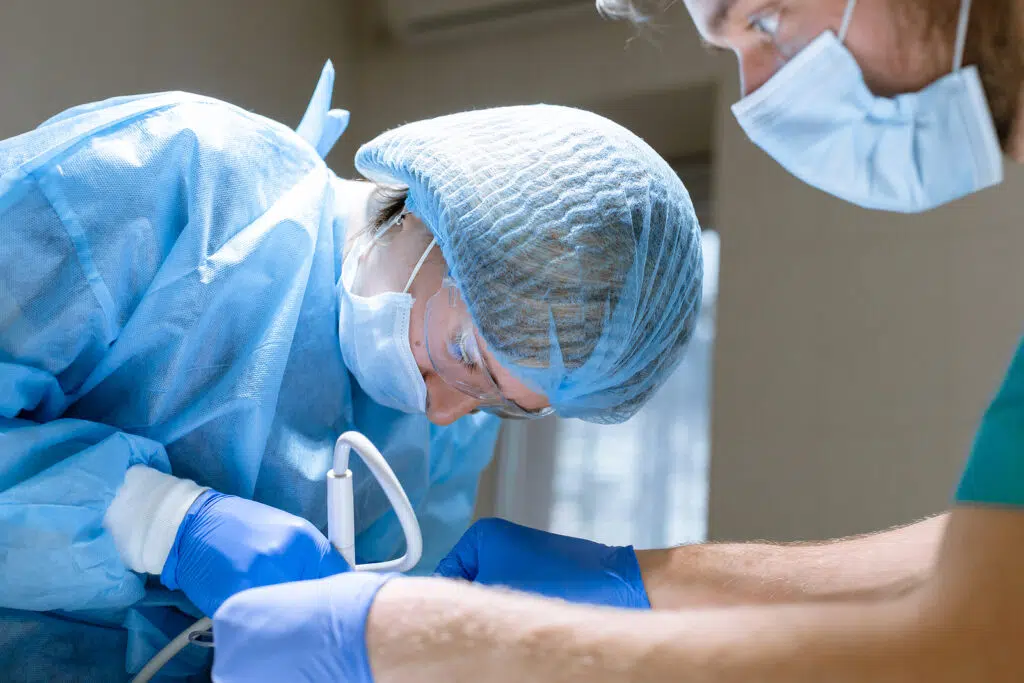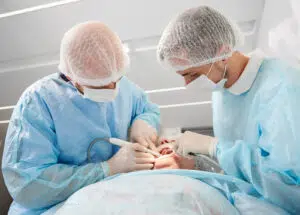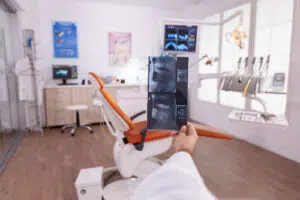
Needing to see an oral surgeon for treatment can cause feelings of anxiety, especially if you are not certain what an oral surgeon does. But understanding what oral surgeons do and the procedures they perform can go a long way toward making the experience less scary and intimidating.
What does an oral surgeon do?
An oral surgeon is a professional who specializes in performing simple and complex procedures inside and around the mouth and jaw that a general dentist may not be able to do. This can range from tooth extractions to major surgeries.
Oral surgeons receive 4-6 years of additional education and training for their profession. Additional training includes internal medicine, anesthesiology, otolaryngology, emergency medicine, and plastic surgery during a hospital residency.
Do I need an oral surgeon?
A routine appointment with your dentist usually determines your need to see an oral surgeon. While a dentist can handle most dental problems, an oral surgeon may be necessary to deal with specific problems a dentist does not have the proper amount of training to fix.
If you are experiencing symptoms such as pain, swelling, and fever, you might have an infection. In addition, you may also notice bleeding, an abscess, a broken tooth, or tissue damage in your mouth. All of these could signal the need for an oral surgeon.
Procedures An Oral Surgeon Performs
After an examination, your dentist might recommend an oral surgeon to perform the following procedures:
- Wisdom teeth and other tooth extractions
- Jawbone grafts
- Dental implants
- Gum grafts
- Biopsy to detect oral cancer
- Arthroscopic TMJ surgery
- Reconstructive surgery
- Emergency surgery
- Sleep apnea treatment, which involves removing excess tissues from the back of the throat
- Frenectomy, which involves removing restrictive folds of tissue from the inside of the upper lip or under the tongue
- Root canal
- Tumor removal
Is oral surgery major or minor?
Most oral surgeries are minor, but some are or can be major depending on the severity of your condition and overall health. More complex procedures such as a root canal, jawbone grafts, reconstructive and emergency surgeries, and gum grafts are considered major procedures. Minor procedures include teeth extractions, dental implants, frenectomies, biopsies, and arthroscopic TMJ surgery.
A minor procedure that has complications such as an infection during tooth extraction or the need for a jawbone graft for dental implants, can turn those procedures into major ones. Most procedures take 90 minutes or less for the oral surgeon to complete. Some, however, like sleep apnea tissue removal or reconstructive surgery can last two or more hours. Recovery times also vary per procedure.
Emergency Dentist vs. Oral Surgeon
Understanding the difference between an oral surgeon and an emergency dentist can save you time and money.
- Emergency Dentist
An emergency dentist is available at times such as after-hours or weekends to handle serious dental problems that arise when your regular dentist is off the clock. Finding an emergency dentist is as easy as performing a ‘near me’ search on the Internet.
Regardless of location, seeing an emergency dentist first is the best choice if you experience a painful toothache, notice an abscess, or have a broken or missing tooth. Basically, if you have serious concerns about an issue that could be serious, see an emergency dentist right away.
The emergency dentist is going to focus primarily on locating the pain in your mouth and alleviating it. That means you likely won’t receive a full exam unless your problem is more complex. X-rays will be taken, however, and tooth extraction may be necessary if saving it is not possible.
Emergency dentists also treat bleeding gums, infections, nerve exposure, swelling, missing fillings, and broken crowns.
- Oral Surgeon
While an oral surgeon can also provide emergency services, these services are generally surgical. An emergency dentist may refer you to an oral surgeon for emergency care that you could receive the same day if both types of dentists work in the same office. An oral surgeon extracts teeth below the gumline by exposing the roots, which requires cutting into the gums. For more about other procedures oral dentists perform, see above.
General Dentist vs. Oral Surgeon
One major difference between general dentists and oral surgeons is that oral surgeons complete a four to six-year surgical residency at a hospital. Oral surgeons receive more training and education than general dentists.
General dentists, like oral surgeons, also attend and complete dental school, but not a surgical residency. General dentistry is geared more toward routine care such as dental cleanings, dental fillings, simple tooth extractions, root canals, and crowns. Complex surgical procedures are left to oral surgeons.
Depending on how much training and education each receive, there is often plenty of crossover between emergency dentists, general dentists, and oral surgeons. However, oral surgeons are the only choice when routine procedures are more complex or serious than normal.
Do I need a referral?
In most cases, a referral from your dentist is a requirement to see an oral surgeon. However, some oral surgeons offer emergency care and appointments if you call ahead.
Preparing for Oral Surgery
The need for oral surgery can cause strong feelings of anxiety and fear, but you can reduce these feelings by adequately preparing for your procedure.
- Arrive at least 20 minutes early to fill out paperwork and check-in at the front desk.
- Refrain from eating or drinking anything for 8-10 hours prior to your surgery.
- Make sure you arrange for a ride home if your procedure involves anesthesia.
- Ask any questions or share any concerns you may have about your procedure.
- Wear short sleeves so nurses can check your blood pressure and place IV lines without obstruction.
- Create a clean and comfortable space for you to comfortably recover at home.
- Fix your bed so you can sleep in an incline position to promote healing.
Make an appointment today!
View this post on Instagram
Dentistry at Bonney Lake offers general dentistry and emergency dentistry services as well as oral surgery. Our team has the experience and skills to treat a wide range of problems. We also stay up-to-date on the latest techniques and practices and use up-to-date technology to make our patients comfortable and give them the best care possible.
To make an appointment, call our office at 253-236-7456 or visit our website today! We are here to help you regardless of what kind of dental care you need.
New Patient Specials
New patients are invited to take advantage of one of our first-time visitor specials!
To claim the offer, screenshot or print the coupon and show it at your initial appointment.
$149 New Patient Special Plus $100 Off Your Second Visit*
**New patients only. A $369 value. Cannot be combined with other offers or insurance.
10% Off Same Day Dental Services*
**New patients only. Cannot be combined with other offers or insurance.
$100 Off When We Treat Two Family Members on the Same Day
**Cannot be combined with other offers or insurance.
New Patient Online Offer
Receive $100 off Future Dental Treatment
with a New Patient Exam
Call (253) 236-7456 today to schedule.
Ready to Book Now? Use our Online Scheduler
BOOK AN APPOINTMENT
Patients choose Dentistry @ Bonney Lake for our convenient scheduling, affordable pricing, outstanding service, and incredible results. Experience the difference today!



